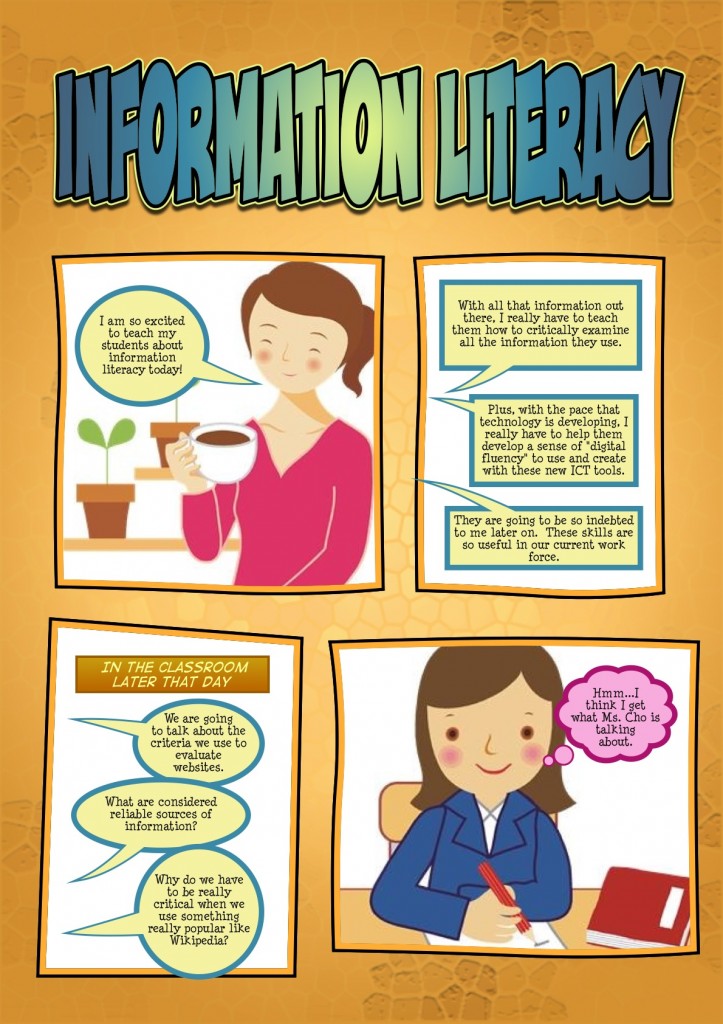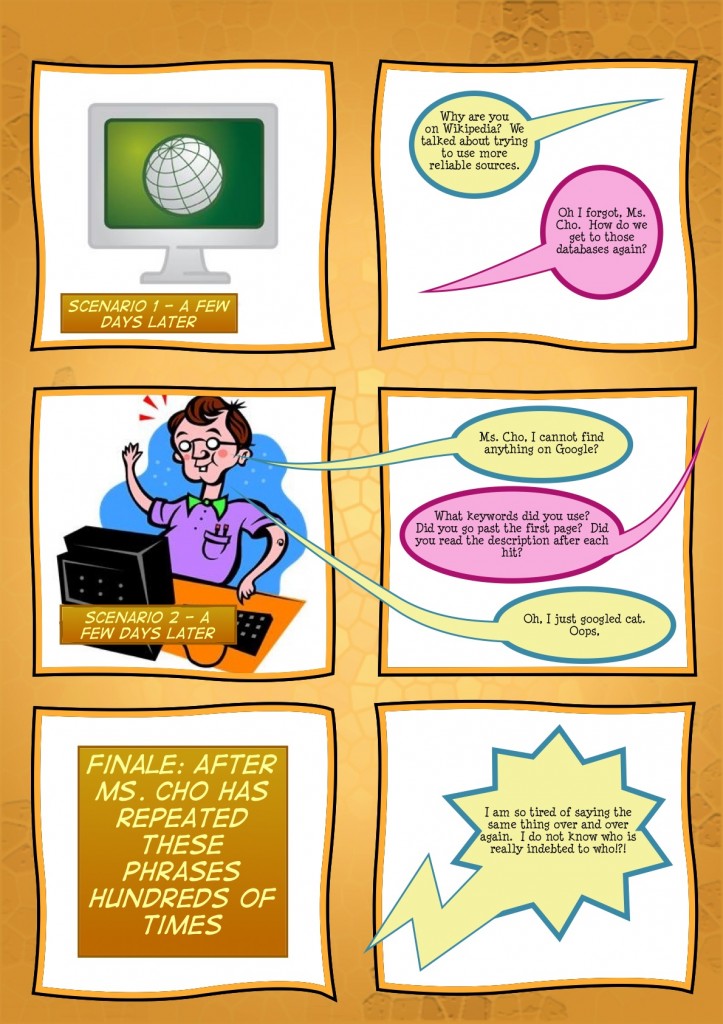What policies govern your uses of ICT in your school setting?
There are general district wide policies that govern access to online learning resources. These district wide policies indicate we are to guide students in their use of online resources. The policy can be found on the policy manual on the district’s website. However, at the school level, there are no official policies governing uses of ICT. We use the district policies along with rules developed using our professional expertise at the school level and as certain problems arise.
What digital resources do you have available for teaching and learning in your school setting?
As a district, we have shared access to a variety digital resources linked to our online digital catalogue. They include paid databases like World Book and EBSCO. We also have some databases that are geared toward specific subjects, like Biography in Context and Culturegrams. There are also several free databases linked on the catalogue website, including the Canadian Encyclopedia. On the website, we have also provided a trial to access ebooks. Lastly, there are many links to online digital resources that may be of interest to teachers and students, like reading lists and classroom tools (e.g., Prezi and Wordle)
Please provide an example of an exemplary use of digital technologies for teaching and learning that you have observed or experienced personally?
This is a difficult question to answer because I feel that many of my staff have made exemplary use of digital technologies considering that many of them have only limited experience with technology. However, there is one unit that the French teacher did last year that really stood out to me because it was really engaging for the students. It also allowed them to show their learning in a different way then they were used to. The students had to produce a short film in French incorporating the new vocabulary they had just learned about food and restaurant etiquette. The students had to develop a script and used Google Translate to help them develop the dialogue. Then, they had to learn about how to divide their script into scenes to be filmed using an Ipad. Then, they learned the nuts and bolts of using iMovie to edit their video footage. The teacher acted as a facilitator as some students branched out and figured out more advanced and creative ways to use the software. As a finale, the students showed the films on our new interactive whiteboard in the library. I thought it was such an exemplary use of digital technologies because it was a classic example of how digital technology could turned a mundane task of learning vocabulary into a fun, creative, and practical project.
Please provide an example of a problematic use of digital technologies for teaching and learning that you have observed or experienced personally?
I think one of those most problematic things in the use of digital technology is always having everything set up and not being able to execute a lesson due to technological difficulties. Another problem we have had recently is that many websites need you to register with a email in order for you to use their program. However, some of the students do not have emails, so we have tried to rectify this by having signed permission from their parent or guardians. This brings up the question of what to do with the students who do not get permission to use the resources and those who do not have access at home to technology which allows them to complete the assignment. Furthermore, it brings up the questions of whether digital literacy becomes a mandatory part of the curriculum and how to level out the issue of social equality when it comes to access to technology.
Please provide a brief history of how you learned to use digital technologies (personally and professionally).
I think I learned how to use digital technologies as the need arose and my personal interest for technology grew. In high school, I loved graphic design and was enrolled in several of the classes. At that time, many of the art processes that were completed manually were being converted digitally. For example, instead of drawing a triangle, we could now digitally draw using new software on the computers. We were one of the first schools to have a classroom set of the first generation MacIntosh Classic desktop computers with the disc drive just under the screen. I still remember that excitement I had while using these computers. Through the years, there were many situations where I would just need to learn new digital technologies, from having to type up an essay using a desktop publishing program to having to learn how to use a variety of iPad apps for my job as a teacher-librarian who facilitates 20th century learning.
So how did I learn to use these digital technologies? In high school, I began learning about digital technologies from my teachers. I then experimented on my own to expand on what I had already learnt. In some of the office environments I worked in during university, I learned from other staff and if I needed help I would use the help-guides. As the internet became more popular, I learned how to use the internet through trial and error; persisting through my own passion for the world of information the internet offered. Later on, as a teacher-librarian, I found that many companies that developed these digital resources really wanted you to use them by providing online help-guides and video tutorials on their website. Furthermore, I notice that the idea of going to classes to learn how to use a certain digital resource has diminished in favour of user-friendly resources that can quickly help you pick up how to use them. Lastly, I have learned about and how to use many digitals from other people, including friends and other teaching professionals.
How would you rate your digital technological proficiency? 0 = low level of proficiency -> 10 = high level of proficiency? Why did you give yourself this rating?
I would rate my digital technological proficiency at 7.5. I would give myself this rating because I feel like I have a good understanding of the current role of the teacher-librarian as a facilitator of the use of digital resources. I have also gotten the opportunity to put the aspects of this role into action in my previous school. Using the variety of digital tools in my previous school, I have been able to use and experiment with them with students and staff. I feel like this have given me the foundation to approach new digital technologies. However, since technology is changing at such a fast pace, I feel that there is always something to new to learn. Therefore, I think you can never say you are completely proficient at digital technologies. Instead, I think we are always students when it comes to learning about digital technology.
What do you hope to accomplish in this course?
I am entering a new school this September as the teacher-librarian. My new school has just begun to start their journey into digital learning. Before the school year begins, I really want to have established my vision for my library as 20th century learning space. I hope that after the completion of this course, I would also be able to answer the variety of inquiries and problems about technology that my staff will have. I would also love to continue building my digital resource “bag of tricks” so that I can easily pull them out when I am collaborating with a teacher on a project.


Recent Comments